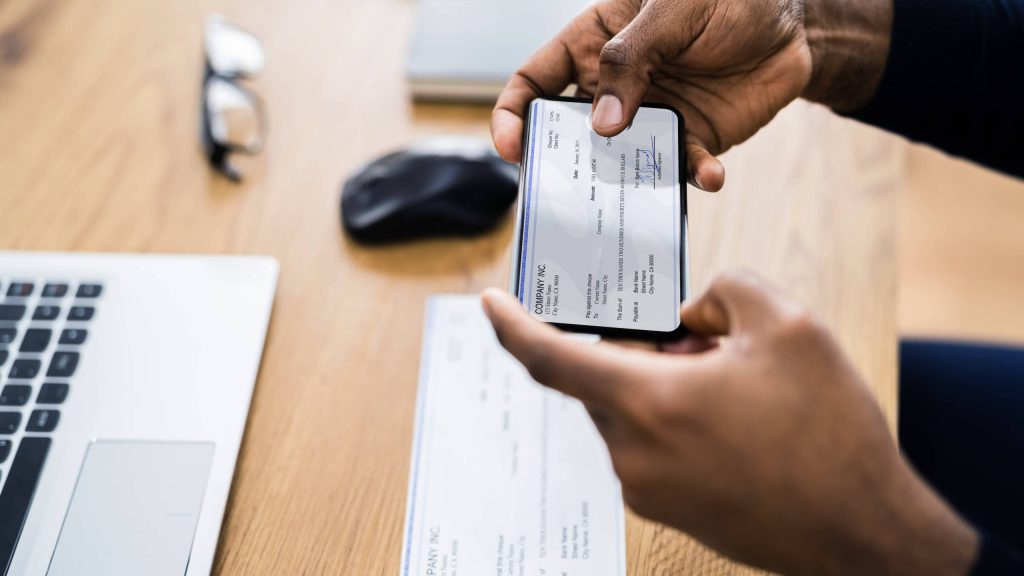Banking from your phone, specifically mobile check deposits, is a popular and convenient feature today. Unfortunately, mobile check deposit scams are rising due to this convenience. Young people are especially vulnerable to financial phone scams, according to a 2022 study. 62 percent of respondents ages 18 to 34 have experienced a financial loss in their lifetime from a mobile phone scam. Here’s what to look for to avoid getting caught up in a scam involving your money.
Work from Home Scams
Say you’re surfing Craigslist for a job posting, and you come across a listing about receiving payment for your work in advance. These are often for mystery shopper positions or overseas companies advertising remote jobs. They tell you there are some start-up costs associated with the position. They might ask you to pay for certifications upfront. Or, they could ask you to deposit a check they send you and wire part of the money back under the pretense of overpayment. Either way, it’s frustrating to realize that the check is fake, leaving you with the losses.
Sweepstakes Scams
Other common mobile check deposit scams include sweepstakes or claims of an estate inheritance. For example, you get a letter saying that you’ve won sweepstakes you never entered or an unexpected financial windfall from a wealthy relative. The scammer then asks you to claim your prize by paying a wire transfer fee or purchasing gift cards. Again, this is a way of extorting money that is untraceable to a bank account.
Online Listing for an Auction Item
You are selling an item from eBay, Craigslist, or another listing site. The remote buyer offers a check greater than the listing price and then asks for the difference back. They tell you to wire the difference via money order or ACH, only to realize a week later that the original payment they sent has bounced. Accepting checks from an unknown party is a vulnerability. Banks must provide the funds from a deposited check within one business day, and it can take weeks to discover the check as a fake. This can leave you with terrible inconveniences like fees and overdrafts, all from a fake check.
Tips for Avoiding Mobile Check Deposit Scams
Mobile check deposits are convenient, but here are some tips for banking wisely from your phone. Don’t accept checks from unknown parties. Checks are ok from businesses and institutions you know, but from online listings or strangers, ask for cash payments instead. This ensures a safer, traceable transaction. Never send a wire transfer to someone you do not know. Do your research and verify that the business and payee’s name and address are accurate. Never accept a check for more than the listing amount. This is almost always a scam.
Check your account balance and keep your credentials private. A legitimate payer won’t ask you to send them money back or for your bank account information over the phone. Be on guard about these suspicious behaviors and never give out your information to anyone! Even your bank will not ask you for password or username information. One way to prevent a scam is to check your account balance often. Contact your bank or credit union immediately if you see an unauthorized charge.
Use Senior Safeguard to Help Your Parent or Loved One Avoid Mobile Check Deposit Scams
Sometimes safety measures that keep us away from scams can be challenging for senior citizens who aren’t accustomed to mobile banking. DEXSTA is helping safeguard such members through the power of education. Our Senior Safeguarding information is an extended partnership between Cooperative Credit Union Association and EverFi, a digital education company. Not only are free resources available to educate senior citizens about the dangers of check and identity fraud, but this partnership trains credit union members on the signs of elder-targeted scams to protect our members. In addition, help your elderly parent or neighbor avoid being targeted for identity or mobile check deposit scams with this resource.
Get Free Automatic Fraud Alerts from DEXSTA on Your Debit and Credit Card Accounts
Members of DEXSTA are automatically eligible to receive fraud alerts via SMS, phone, or email. This is a free automatic service our members are enrolled for upon opening an account with us. Confirming your contact information is the only step to receiving alerts about suspicious transactions on any of your accounts. Of course, if your concern is regarding a check, you can always call us directly with your questions at 302-571-0522. Use these common-sense safety measures to keep your money safe with DEXSTA and learn more about these free fraud alerts.
